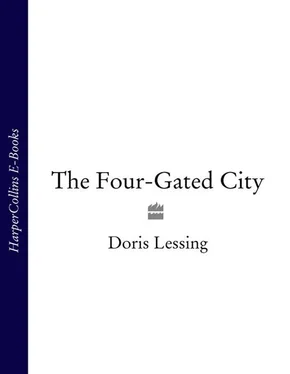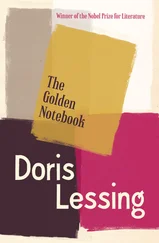‘I think I know something for you,’ said Phoebe, pushing aside the personal, while her face still flamed red, and her fingers clutched her purse. ‘There’s my brother-in-law. My ex-brother-in-law. He wants some help. He’s a writer. Of a kind, of course. It’s a hobby really. He’s got some sort of a business or other.’
‘What sort of a writer?’
A silence. Phoebe took a mouthful of weak coffee while Martha registered an old atmosphere: oh yes, she had been here before, and very much so. ‘He did get a book published.’ Another sip. ‘It got quite good reviews.’ One could see that the good reviews were not only a surprise, but a disappointment. She disliked the man, or disliked the book? No, the atmosphere was so strong that Martha waited for the next phrase with confidence. ‘I haven’t any time for books that aren’t about something real, have you?’
So Marjorie might have said; or Anton. Among a selection of similar phrases, she could also have used: I’m not interested in ivory tower writing. No, that would probably be too literary a choice of words for Phoebe.
Martha tried: ‘What was it about?’ ‘Oh, just personal emotions.’ ‘Well, I need a job.’
Here Phoebe looked, lips tight, at Martha’s suitcase. ‘Where have you left your luggage?’
Almost Martha let ‘Matty’ say for her, humorous, deprecating, charming: All I’ve got in the world! ‘That’s my luggage.’
‘You must be a very efficient packer,’ said Phoebe, making a virtue of poor material.
‘What sort of help does he want? What’s the job?’
‘Oh, I don’t know – he’s always running about, you know, he’s got so many irons in the fire. He lives rather near here, actually. I was thinking, we could drop in if you’ve time?’
‘Yes. Good.’
‘Dropping in’, so much not what Martha had experienced of London – that is, the London where people actually lived in houses, had organized lives, as distinct from the wanderers and campers – meant that Phoebe had a special relation with this man?
‘I’ll telephone,’ said Phoebe.
One didn’t ‘drop in’ without telephoning first.
Phoebe went across to the waiter, conferred, and disappeared into a door marked ‘Private’. She came back to say: ‘Mark says we can come round. He’ll be free at two-thirty for an hour.’
Yes, that was more like it: one was free by appointment for an hour. What made the difference? Of course, servants! With servants, plentiful and cheap, one could drop in, drop by, stay for meals, develop large casual acquaintanceships.
Around the corner meant Bloomsbury.
Martha’s arms were both wrenched by the suitcase to a condition of permanent ache. She suggested a taxi. Phoebe never used taxis. They went by bus.
The house was not part of one of the famous squares, but nearly so: from the front door, it seemed as if the trees and plants of the square claimed the house. Tall, narrow, formal, it was like the houses of the squares; and the whole neighbourhood, now that the different shades of ‘white’ chosen by their owners before the war had dimmed into an unremarkable but uniform grey, had the unity of its original design: houses, terraces, grassy squares full of old trees. Here, in short, one thought of the beauty of London, not of its ugliness. Standing in the hall of the house, which had Persian rugs on a dark floor, and a minimum of old furniture. Martha knew that for the first time in her life she was in a setting where, if she chose to stay, there would be no doubt at all of how she ought to behave, to dress. She had always resisted such a setting, or the thought of it. If she took this job, then it must be for a very short time. She felt attacked by the house – claimed. Besides, she was out of place. And so, she noted, was Phoebe, who was dowdy, seemed clumsy, where she, Martha, was strident.
A man came down the stairs, half-seen until he turned on a light. He was dark, and of middle-height; but he was strongly built, and his face strongly featured, so that he gave, at once, an impression of force and of height. A presence: a strong one. But then he spoke, and what came over was anxiety, worry, even annoyance.
‘How very good of you … let me …’ here he took Phoebe’s coat over his arm, and Martha’s suitcase from her hand. ‘Now let me see. Really, Phoebe, it is so very kind of you to take so much trouble.’ He was giving them no more than the courtesy he felt that he should. Either something had happened since Phoebe had telephoned half an hour before, or he had taken a dislike to Martha on sight. At which Martha reacted – and saw herself doing it – with the childish: All right then, I don’t think much of you either! For she didn’t. The colonial in her named his politeness insincerity, since he was so clearly angry about something; and the worry that he radiated was alerting her nerves for flight. She wondered how quickly she could make excuses, while Phoebe reclaimed her coat, saying she had work to do and must leave at once.
‘No, do stay, do, Phoebe,’ he almost cried, his face anguished in his effort to smile. ‘Let me see now, where …’ He opened a door off the hall, displaying a drawing-room. ‘I’m sure Margaret wouldn’t mind my using …’
Martha understood that she was about to be interviewed, by a man who had no taste, either for her, or for interviews, she could not decide which, and he was trying to decide on an appropriate place for it.
‘I’m very sorry,’ said Phoebe, reproving his lack of faith in her busy-ness. ‘Let me know how things go,’ she said to Martha. ‘Because if you and Mark don’t suit each other, then I’m sure there’s plenty of work that needs to be done.’ She went.
Martha and Mark Coldridge stood in the hall, left to their own decisions.
‘You aren’t the young lady from Birmingham?’ ‘No, should I be?’
‘Oh, well then …’ He held the door open and she entered the long, subdued, beautiful room which looked as if no one had been in it for months.
‘For some weeks now Phoebe has been urging me on to some protégée of hers from Birmingham. Labour Party or something.’
He was looking at her more closely. She stood, to be inspected; examining him. But all she felt was: here are claims. Not only from him, the man, very strong ones, though she did not know how to define them; but from the house, the furniture – even this area of London.
‘Look,’ said Martha, almost becoming ‘Matty’ in her desperation to escape. ‘There’s been a mistake. You’re in a false position. I’m so sorry – I’ll leave.’ And she was on her way to the door.
‘No. Wait. We’ll go upstairs,’ he said, thus making it clear that Margaret’s room, whoever Margaret was, had been chosen probably to put off, or intimidate, the young lady from Birmingham, or Phoebe – at any rate, the room was seen as a kind of no-man’s land or defensive area. She followed him upstairs to a small room on the first floor, which being full of books and papers and comfortable clutter, made it easier for Martha to sit down.
‘Who are you then?’
She replied, giving him minimum information, resisting impulses to reply as she had done to other strangers, I’m Patty Jones, I’m Joan Baker, I’m the mother of twins or the sister of a sailor who …
‘And what kind of job did Phoebe say it was? What are you expecting?’
This so far away from the suavity which was one of his inbuilt attributes, indicated so much anxiety, defensiveness, that again she was on the point of running away. She examined his face before replying: a dark, strong, well-featured face. Handsome? As handsome as it did: it was all clenched up with watchful tension.
‘You needed some sort of help with a book, but I don’t really think …’
Читать дальше












